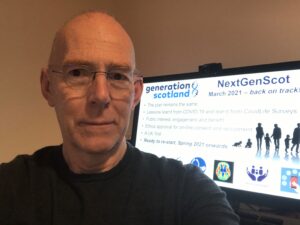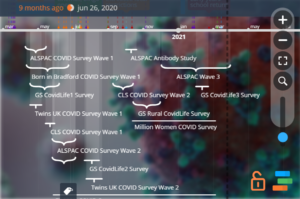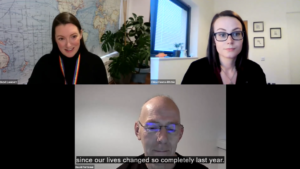One Year of CovidLife

Preparing for my Research Insights Talk
The UK entered lockdown on 23rd March, 2020. The first anniversary of that day was one for sober reflection. But as vaccination has brought COVID-19 case numbers way down, it’s appropriate to send out a Happy Easter message to all. Yes, it will once again be a ‘stay at home’ Easter, but hopefully the last. We are not quite out of the woods yet though. We still have to stick to local parks and woodlands for our exercise and limit socialising if we are to avoid another surge. It is great that schools are back, if but briefly. The good news is that children (and their teachers) will be experiencing a more familiar end-of-term and school holiday.
The Generation Scotland team has been working flat out this last year, but we do make time for regular online social breaks. There has been a lot of talk about chocolate, particularly of the Easter egg variety. Some favour dinosaur-sized and sweetie-filled varieties, others cream or caramel filled standards, but there is also a growing vegan lobby.
Talking of vegan options, I was fascinated to read that biotech has found ways to switch yeast from making cakes or bread to cutting out the needs for honey bees to make honey or chickens to make egg white. What else and where next will biotech take us? At a very practical level, we have got used to gin distilleries switching to making hand sanitiser and of course to biotech making synthetic RNA vaccines. Innovation and adapting to changing circumstances is a hallmark of human society.

Covid Study Timelines
So where are we now with our research? We have tracked the many events, milestones, setbacks and breakthroughs along the way using an interactive time chart. We will keep doing so as the vaccine roll-out continues, the restrictions ease and we move towards recovery. You can access the timeline in the link below.
This time chart is part of the work we have been doing in partnership with the Children of the 90s, a study based in Bristol. They have been around for a good bit longer than Generation Scotland and we learnt a lot from them when planning our study. The babies in their study have passed through childhood and into adulthood. The children of the babies are now joining in. For us, it has been more the reverse, from grandparents to parents and children. Soon, we want to include younger members of Generation Scotland families and new families, from age 12 and up. More on that next month.
When COVID-19 hit us, both Generation Scotland and Children of the 90s switched to running surveys on how our volunteers were feeling and coping under the pandemic. We are both funded by the Wellcome Trust, who spotted an opportunity. Would we join forces and share our questionnaires with other researchers? We agreed to do so and quickly found many other studies willing to share. You can find out more in the link below.
The Wellcome Trust’s Covid-19 Questionnaire
For most health researchers, there is at least one ‘must attend’ meeting each year. You get to showcase your work and find out what other research groups are up to. It’s often a time for you to reflect and refresh, come up with new ideas and insights, and bring these back to the team. For us, the ‘must attend’ meeting is on ‘Longitudinal Population Studies’, organised through the Wellcome Trust and held at a lovely ‘out of town’ campus near Cambridge. Last year’s meeting had to be cancelled and this year’s meeting was held on-line. It worked well under the circumstances, but how we missed the ‘in person’ experience.
More satisfying in a way was a webinar we gave as part of the University of Edinburgh Research Insights programme. You can hear Chloe and me talk about ‘Generation Scotland – weathering the COVID-19 storm’. We talk for about 25 minutes with a further 15 minutes or so of questions and answers. Watch it in the link below.

Attending Research Insights to give my talk, alongside Chloe Fawns-Ritches (Generation Scotland Questionnaire Officer)
Research Insights: Weathering the Storm
Although the CovidLife Surveys have dominated our working year, if another group comes looking for help, we always try to say ‘yes’. This was the case when then the UK Government Chief Scientist, Sir Patrick Vallance was looking for ‘rapid research response’ to COVID-19. He was keen that this should be driven by studies which had collected information from volunteers from before the pandemic struck. Generation Scotland fitted the bill, so we were invited on board.
The project is being led by University College London. The research aim is to capture and understand what is happening across the UK in terms of infection and immunity, disruptions to health care, schooling and employment, and the knock-on effects on health and wellbeing. We are sharing what we have learnt from the CovidLife Surveys.
Now, we’re looking at why some people who catch COVID-19 recover quickly, whilst others do not. It is one of the big questions we still need to answer. We are pooling resources and sharing information gathered over the last year with colleagues across several studies. We will continue to track how everyone fares over the year ahead. The hope is that we will learn to spot those who might struggle most and help them in their recovery.
On that note of hope for the future, keep safe and have a Happy Easter.




Recent comments